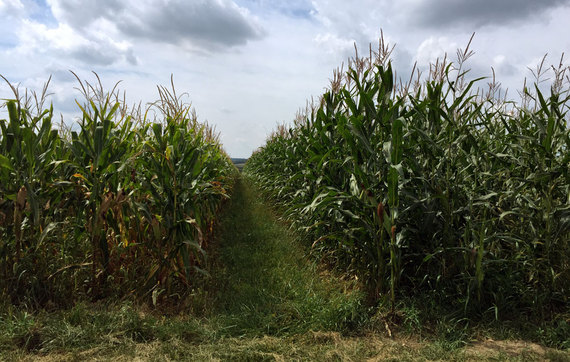1. Invent organic
The first phase was when my grandfather, J.I. Rodale, invented the idea of organic. If you put it into scientific language, this is the hypothesis he created: Healthy soil equals healthy food equals healthy people.
2. Prove organic
Like any good hypothesis, it must be proven scientifically, which is what we started doing in 1983 with the Farming Systems Trial. As the picture shown above reveals, we have more than proven scientifically that organic is a viable, productive, and profitable way to farm--and the only way to feed people for the long term and mitigate climate change. (It was about 100 degrees inside the barn that night, by the way.) There are still many things left to prove, but that organic farming works better than conventional is not one of them.
3. Institutionalize organic
Our next step was to work together with all the people and organizations involved in organic farming to create the USDA Organic Certification. It took more than a decade, and it was what propelled the organic movement and market to a whole new level.
4. Demand organic
Through all our research and education, we have now succeeded in convincing the majority of consumers that organic is healthy, delicious, and worth it for both health and environmental reasons.
5. Supply organic
The biggest obstacle we now face is that there is not enough organic food in America to supply the demand! As a result, we need to transition as many farmers and acres to organic as possible. And that is where the Rodale Institute will now be focusing the majority of its efforts.
We've also learned at least four things on this journey...and now we are in the process of learning the fifth thing...
1. To be an organic pioneer takes courage and resilience
OPA award winner David Vetter talked about overhearing three farmers take bets on how long it would take for him to fail at organic farming. They gave him between 1 and 3 years. Five years later, he was the only one still farming, and now over 60 years later, he has helped many other farmers transition to organic.
2. We need need patience and persistence
True, lasting, pioneering change takes time. Generations! So taking one step forward every day is important and the only way to get there.
3. Emotions and experience change hearts and minds faster than facts do
Maybe someone gets sick, or has a financial crisis, and then suddenly they are open to a new way of doing things. People are stubborn and tend not to look for alternatives until they need to. It's just human nature.
4. But you need the facts
For so many reasons, we need to be ready with facts for when people are finally willing to change and are looking for alternatives.
Every single one of our organic pioneers has been part of this journey, and all of them are amazing leaders and models of what is possible. I am so proud of all of them. (For a complete list through the years, click here.)
And now for number 5...what we still need to learn...
The other day I brought a friend to the institute for the first time, and he asked a simple question: "How did we get into this mess in the first place?" At first I didn't want to answer because it was too complicated. But then I realized we are in this mess for two reasons: People have been afraid of nature and tried to control it. And lots of people have made lots of money taking advantage of that fear.
So how do we get out of "this mess" and move beyond fear?
5. Love. We need to love nature. Love diversity. Love our differences. Love each other.
Money can buy a lot of things--and we rely on it to do our research and support our staff and do our work. But it can't buy love. And that's what I'm most grateful for--the love I have felt and feel for so many of you: readers, farmers, supporters, friends, family, anyone who eats and appreciates where food comes from.
So take a minute out of your busy day and think about it. Think about love. And more importantly feel the love. And with that positive energy, you too can be an organic pioneer.
For more from Maria Rodale, visit www.rodalesorganiclife.com/bymaria

